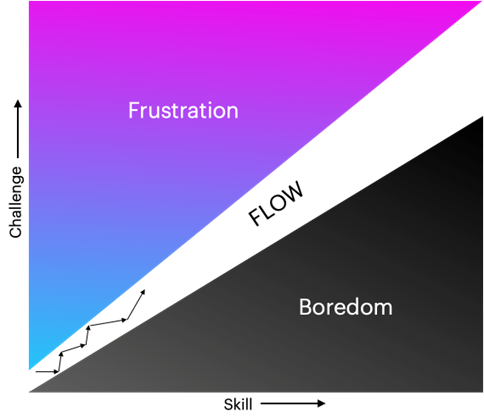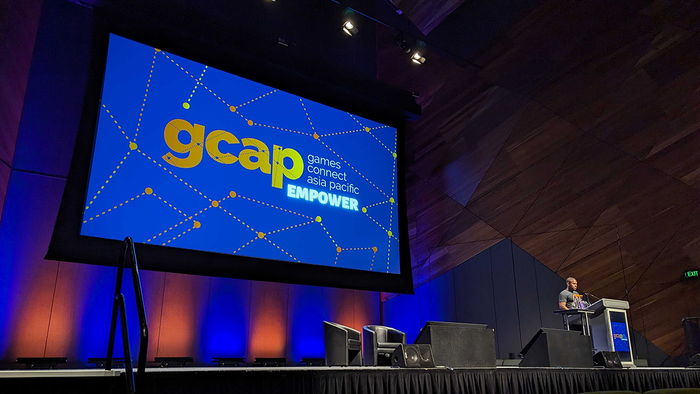
Featured Blog | This community-written post highlights the best of what the game industry has to offer. Read more like it on the Game Developer Blogs.
Getting Gamers in the Zone: Understanding Flow
The secret to engaging gameplay may lie within the concept of "flow," a psychological phenomenon that may well be the Holy Grail for game developers seeking to captivate their audience.

In a world where over 227 million Americans – a staggering 70% of adults – are regularly playing video games[1], it's evident that gaming is no trivial pursuit. When asked why they play, players overwhelmingly believe video games hold the power to positively impact their lives: 90% of players find joy in gaming, and 87% affirm its role in mental stimulation and stress relief. Scientific studies have confirmed many of these beliefs, including ones that found casual video games (e.g., Bejeweled and Plants vs. Zombies) helped alleviate symptoms of depression[2] and anxiety[3]. What makes video games so beneficial for mental health–and which ones offer the most benefit? With a dizzying array of games, genres and mechanics, how can players–and developers–understand the emotional impacts a game will have? The secret to engaging gameplay may lie within the concept of "flow," a psychological phenomenon that may well be the Holy Grail for game developers seeking to captivate their audience.
Visualizing the Flow Channel: Your Pathway to Game Design Glory
Imagine a channel, a state of awareness nestled between the realms of frustration and boredom – that's the sweet spot where every game designer aims to lead their players. This channel, often referred to as the "flow channel," [4] embodies the core objective of game design. It's here that players find themselves fully immersed in the gameplay, losing all track of time as they experience intense focus and engagement. This state of flow, sometimes called being 'in the zone,' is what transforms an ordinary gaming session into an extraordinary experience.
The Dance of Challenge and Skill: Crafting the Perfect Gameplay Symphony
So, what exactly is this flow channel, and why should game developers be focused on it? Imagine a delicate dance between the challenge an activity presents and the skill level of the player (refer to Figure 1). When skill vastly outpaces challenge, boredom sets in – remember playing tic-tac-toe with a toddler? Conversely, if challenge eclipses skill, frustration prevails, leading to repeated failures and anxiety. But when a game aligns challenges and rewards with the player's growing skill level, the enchanting realm of flow emerges.

Figure 1. Achieving the Flow state relies on challenge and skill evolving in harmony. When challenge and skill are well-matched, players experience flow. If either element dominates, boredom or frustration takes over.
Unlocking Mastery: The Sawtooth Symphony of Flow
Here's where the magic happens: challenge and skill don't always walk hand in hand. At times, your skill might sprint ahead of the challenge, offering a taste of mastery and accomplishment. At other instances, the challenge might surge, evoking a sense of tension. This dynamic interplay, depicted in the sawtooth pattern of Figure 1, is the key to crafting a riveting gaming experience. Life's most fulfilling activities, be it gaming or real-world pursuits, mirror this rhythm – challenges that drive growth, punctuated by moments of reflection and skill consolidation, leading to the next exhilarating challenge.
Personal Playgrounds: Crafting Flow for Diverse Players
Every player's journey is unique, shaped by their individual personality and skillset (refer again to Figure 1). These facets determine how easily one succumbs to frustration or boredom, effectively molding the boundaries of their flow channel. The pace at which skills evolve can either catapult an individual into a flow-rich realm or leave them stranded in the doldrums. Unlike life's unpredictable challenges, games offer clear objectives and tailored difficulties, embedded in instantaneous feedback loops. However, not all games resonate equally with everyone, and recent research[5] unveils the intricate interplay of personality, motivation, and skills in shaping one's fun, flow, and engagement levels.
Power to Personalize: Igniting Flow with Adaptive Gameplay
Developers are now exploring how to dynamically adapt games based on player's in-game performance (i.e., cognitive skills) and personality metrics. This personalization ensures an experience that maximizes flow and engagement. We believe the experience of flow is positive for people physically, emotionally, and cognitively, and that helping individuals find their flow state will provide each with an invaluable resource that they can continue to draw on in games, and in life.
Embracing the Flow: Crafting Lifelong Resonance
In the grand tapestry of gaming, flow isn't just a transient state; it's a gateway to holistic well-being[6] – physical, emotional, and cognitive. Crafting experiences that guide players into their flow state is a gift that resonates beyond their screens, enriching their life beyond the game realm. We, as game developers, have the rare opportunity to embark on this quest to harness the art of flow, transforming the ordinary into the extraordinary, and the mundane into the mesmerizing.
[1] 2021 Essential Facts About the Video Game Industry, the Entertainment Software Association
[2] The Efficacy of Casual Videogame Play in Reducing Clinical Depression: A Randomized Controlled Study https://pubmed.ncbi.nlm.nih.gov/26197075/
[3] Zombies vs. Anxiety: An Augmentation Study of Prescribed Video Game Play Compared to Medication in Reducing Anxiety Symptoms https://journals.sagepub.com/doi/10.1177/1046878118773126
[4] Csikszentmihalyi, M. (1996). Creativity: Flow and the psychology of discovery and invention. New York: HarperCollins.
[5] Kachergis, G. (2023). Video games and personality traits: A deep dive into the science of gaming preferences. https://www.gamedeveloper.com/blogs/video-games-and-personality-traits-a-deep-dive-into-the-science-of-gaming-preferences
[6] Huskey, R. (2022). Why does experiencing ‘flow’ feel so good? A communication scientist explains. https://theconversation.com/why-does-experiencing-flow-feel-so-good-a-communication-scientist-explains-173505
About the Author(s)
You May Also Like







